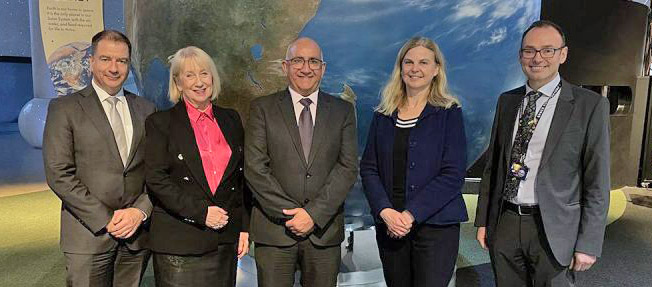Freehold of business centre in West Bridgford sold
Flipping great effort from Derby businesses in pancake challenge
Derby businesses went head-to-head in an annual Shrove Tuesday pancake race to raise money to support the health and wellbeing of residents at YMCA Derbyshire.
Public relations agency Penguin PR lifted the trophy for the second year running beating teams from sportswear giant HUUB, digital marketeers Alphageek and WDS Printers.
The annual event was organised by staff at carbon composite company Pentaxia, in Alfreton Road, and every firm taking part made a donation to YMCA Derbyshire’s campus.
Penguin PR director Sarah Newton said: “We are big supporters of the YMCA and the outstanding work it carries out in the city.
“We usually take part in its annual Sleep Easy and have also cooked the community meal which is run alongside Head High. But of the three events, the pancake race is definitely the easiest way to raise money for them.
“I think the secret to our success is probably that we’re all parents and used to flipping countless pancakes – we certainly weren’t the fastest runners on the day. But the event is really good fun and we’re already looking forward to making it three wins in a row next year.”
It is the fifth time the annual race has taken place and other businesses taking part included Natwest, two teams from Pentaxia and a team from YMCA Derbyshire.
The 25m relay was held over three heats, with each team member required to flip the pancake at the start, the middle and the end.
The winners received a carbon trophy and mini cups, while every competitor received a pot of honey made by Pentaxia’s own bees, who live in five hives at the Alfreton Road site.
Ellie Jackson, from YMCA Derbyshire, said: “We are really grateful to all the businesses who supported the event on Shrove Tuesday – it’s great fun but also raises money for our health and wellbeing programme which funds youth workers, 1-2-1 therapeutic counselling and diversionary activities to improve our residents’ mental health.
“Huge thanks to Pentaxia for staging the event and providing breakfast for all the competitors. It was a chilly morning and the cooked breakfast was gratefully received.”
Details revealed on new 383-space student accommodation scheme at The Island Quarter
The Island Quarter could eventually be home to more than 1,000 students following the submission of proposals for a second phase of purpose-built student accommodation (PBSA) on site.
Plans submitted to Nottingham City Council today (16 February) will see a further 383-space student block built on the Manvers Road side of the 36-acre site.
Combined with the 693 beds at the adjacent Winfield Court – which will open to students for the 2024/25 academic year – The Island Quarter will boast a significant student population once both phases are complete.
The proposals – designed by DAY Architectural – cover a range of accommodation types including cluster accommodation, studios and premium options, along with student community amenity facilities such as a gym, laundry room, various lounges and informal breakout areas.
Following a similar material palette to Winfield Court, the designs include a combination of grey, buff and red bricks on the building’s facade alongside ribbed metal cladding.
Christopher Ware, property director at Conygar, said: “The demand for student housing has never been greater, and PBSA plays a vital role in ensuring that students have access to high-quality accommodation without the need to restrict housing supply that is better suited for Nottingham residents.”
The new student block is the latest planning submission by developer The Conygar Investment Company, following last May’s approval for a new 250,000 sq ft biosciences campus on the northern side of the site.
Ware said: “Intergenerational living has been a core principle for our plans for The Island Quarter, and a healthy population of students is a crucial part of this mix. In a competitive marketplace, these well-designed plans put student experience at their heart, and we’re looking forward to seeing this phase move forward.
“This latest proposal is one of a series of planning submissions that are currently in the pipeline, building on the success of the first phases of the development at 1 The Island Quarter and Winfield Court.”
The scheme has been designed by DAY Architectural with planning, transport and environmental advice being provided by Axis.
David Jones, technical director at Axis, said: “As part of the evolving masterplan for The Island Quarter, this next phase of accommodation has been designed so that the proposed build can complement Winfield Court in design and function while diversifying the student living environments on offer.”

Hucknall Peacocks store sold
Panther secures multi-million pound Silentnight deal
First-time buyers swoop for Nottinghamshire pharmacy as owner retires
Plans submitted for further student accommodation scheme at The Island Quarter, Nottingham
The Conygar Investment Company has submitted a detailed application for the next phase of development at The Island Quarter, Nottingham.
The application comprises a 383-bed student accommodation scheme.
Robert Ware, Chief Executive of Conygar, said: “We are delighted to submit this application for the next phase of our development.
“Nottingham is home to two top class Universities and this scheme will be an excellent addition to the mixed-use development we are creating at The Island Quarter.”
A 693-bed student scheme is already being built at The Island Quarter, topping out in June 2023.











